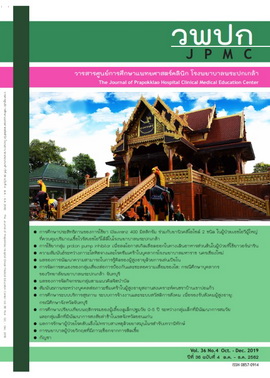The Effectiveness of Piano Playing as A Cognitive Training Program for The Elderly
Main Article Content
Abstract
Background: Aging may lead to the deterioration of cognitive functions, including memory, attention and executive function. Accordingly, brain training could be beneficial for the elderly. Previous studies have reported that practicing music could improve cognitive functions in the elderly.
Objectives: To study the effectiveness of piano playing on cognitive functions in the elderly by comparing the cognitive scores acquired from an experimental group and a control group, as well to compare between pre- and post-piano playing lessons.
Materials and methods: This was a quasi-experimental study. Thirty participants were recruited from the Wood Ball Sports Club of the Federation of Associations of the Elders of Thailand, Kanchanaburi Province by purposing sampling, with 15 participants per group. The experimental group participated in a “One to Five Piano Training Program”. All participants were evaluated for cognitive functions by neuropsychological test pre- and post-piano playing lessons. Data analysis was done by comparing the mean of each sub-test.
Results: The mean scores of the Trail Making Test Part–A (TMT-A) for the experimental group between pre- and post-piano playing lessons showed a statistically significant difference (t = 2.41, p < 0.05). Regarding the mean scores of the Stroop test and Digit span, there was no statistically significant difference.
Conclusion: According to the results, piano playing can improve cognitive function (attention, executive function). Therefore, this is an alternative way to train the brain to slow the deterioration of cognitive functions.
Article Details
References
Foundation of Thai Gerontology Research and Development Institute. Situation of the Thai elderly 2016. Nakhon Pathom: Printery Co.,Ltd;2017.
Kueider A, Bichay K, Rebok G. Cognitive training for older adults : what is it and does it work ?. CENTER on AGING at Amerrican Institutes for Research [Internet].2014[cited 2017 June 21]. Avaiable from: https://www.air.org/sites/default/files/downloads/report/Cognitive%20Training%20for%20Older%20Adults_Nov%2014.pdf
Uptampohtiwat T. Amazing 1 to 5 no everybody can’tplay Piano.PathumThani: Workpoint publishing Co., Ltd;2009.
Rodrigues AC, Loureiro MA, Caramelli P. Musical training, neuroplasticity and cognition. Dement Neuropsychol2010;4:277-286.
Parsons LM, Sergent J, Hodges DA, Fox PT. The brain basis of piano performance. Neuropsychologia2005;43:199–215.
Bugos JA, Perlstein WM,McCrae CS, Brophy TS, Bedenbaugh PH. Individualized piano instruction enhances executive functioning and working memory in older adults. Aging Ment Health. 2007;11:464-71.
Seinfeld S, Figueroa H, Ortiz-Gil J, Sanchez-Vives MV. Effects of music learning and piano practice on cognitive function, mood and quality of life in older adults. Front Psychol 2013;4(Article 810):1-13.
Boonrod V. Using 1 to 5 piano curriculum for developing skills in patients with advanced stage cancer in Srinagarind Hospital, Khon Kaen University: a pilot study[Dissertation]. Khon Kaen: Khon Kaen University; 2014.
Novotney A. Music as medicine. SCIENCE WATCH2013;44(10) :46.
Roy J. Musical training influences sense of touch [Internet].2013 [cited 2018 Oct 2]. .Avaiable from: https://www.sfn.org/~/media/SfN/Documents/Press%20Releases/2013/Neuroscience%202013/Music.ashx
Jäncke L. Music drives brain plasticity. F1000 Biol Rep2009;1:78.
Ungerleider LG, Doyon J, Karni A. Imaging brain plasticity during motor. Neurobiol Learn Mem2002;78:553-564.

